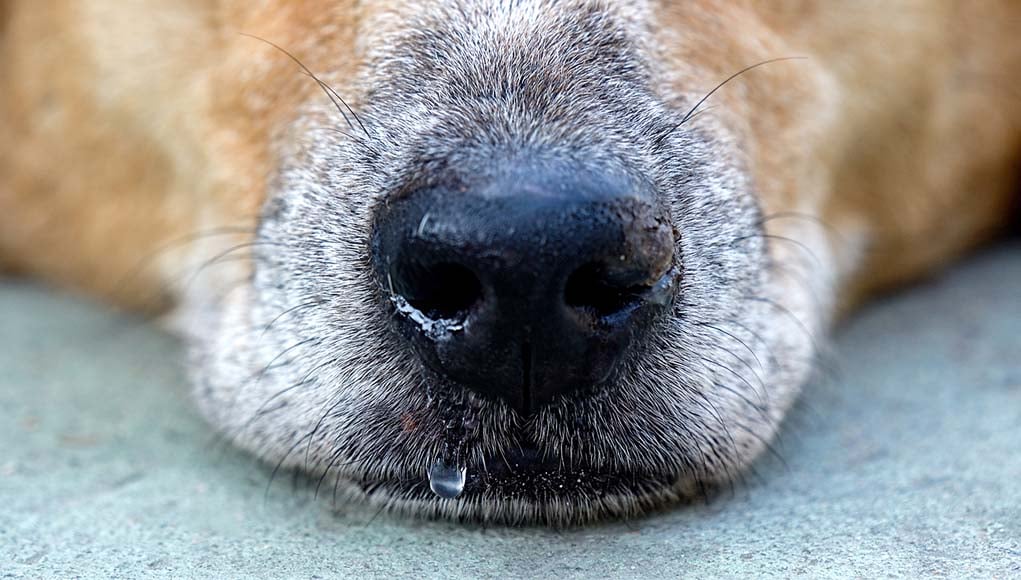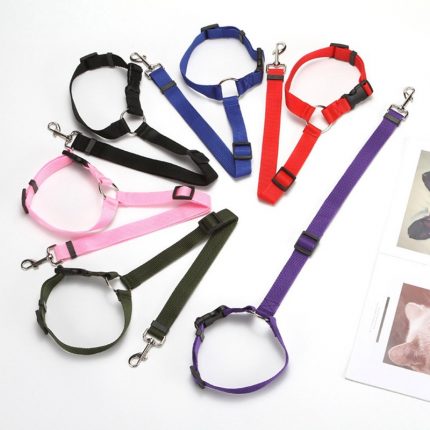Unraveling the Mystery: Why is my puppy’s nose running?
As a pet owner, it can be concerning to notice that your puppy’s nose is running. While it may seem like a minor issue, a runny nose in dogs can indicate various underlying causes that require attention. This article aims to shed light on the reasons behind your puppy’s nasal discharge and provide helpful insights for managing this condition.
A runny nose, also known as nasal discharge or rhinorrhea, is the result of excess fluid production in the nasal passages. It can manifest as a clear, watery discharge, or it may be thick and discolored. The color and consistency of the discharge can provide valuable clues about the possible causes.
There are several factors that can contribute to a puppy’s runny nose. One common cause is allergies, which can be triggered by environmental factors such as pollen, dust mites, or certain foods. Allergies can lead to inflammation in the nasal passages, resulting in increased mucus production and a runny nose.

Infections, both viral and bacterial, are another frequent cause of nasal discharge in puppies. Viral infections, like canine distemper or kennel cough, can lead to respiratory symptoms, including a runny nose. Bacterial infections, such as sinusitis or rhinitis, can also result in nasal discharge accompanied by other symptoms like sneezing or coughing.
Additionally, anatomical abnormalities, such as a cleft palate or nasal polyps, can contribute to nasal discharge in puppies. These structural issues can disrupt the normal flow of mucus, leading to a runny nose. In some cases, foreign objects lodged in the nasal passages can also cause nasal discharge.
It is essential to monitor your puppy’s overall health and behavior when their nose is running. If the discharge is accompanied by other concerning symptoms like coughing, sneezing, difficulty breathing, or loss of appetite, it is recommended to consult a veterinarian. A thorough examination and diagnostic tests can help identify the underlying cause and guide appropriate treatment.
In the next section, we will delve deeper into the main causes of a puppy’s runny nose and discuss their symptoms, diagnosis, and treatment options. Understanding these factors will enable you to provide the necessary care and support for your furry friend.
Exploring the Causes of Nasal Discharge in Puppies
When your puppy’s nose is running, it’s important to understand the potential causes behind this symptom. By identifying the underlying factors, you can take appropriate steps to address the issue and ensure your puppy’s well-being.
Allergies
Allergies are a common cause of nasal discharge in puppies. Just like humans, dogs can be allergic to various environmental factors, including pollen, dust mites, mold, or certain foods. When exposed to allergens, a puppy’s immune system may overreact, leading to inflammation in the nasal passages and increased mucus production. This excess mucus then drips out of the nose, resulting in a runny nose. It’s important to identify and minimize your puppy’s exposure to potential allergens to alleviate their symptoms.
Infections
Viral and bacterial infections can also be responsible for a puppy’s runny nose. Viral infections, such as canine distemper or kennel cough, commonly affect the respiratory system and can cause nasal discharge along with other symptoms like coughing and sneezing. Bacterial infections, such as sinusitis or rhinitis, can also lead to nasal discharge. In these cases, the discharge may be thicker and discolored. Prompt veterinary attention is crucial to diagnose and treat infections effectively.
Anatomical Abnormalities
Some puppies may have anatomical abnormalities that contribute to nasal discharge. Conditions like a cleft palate or nasal polyps can disrupt the normal flow of mucus, leading to a runny nose. These structural issues require careful evaluation by a veterinarian to determine the best course of action. Surgical intervention may be necessary in some cases to correct the underlying problem and alleviate the nasal discharge.
Foreign Objects
It’s not uncommon for curious puppies to stick their noses where they don’t belong. In some instances, foreign objects can become lodged in the nasal passages, causing irritation and nasal discharge. If you suspect that your puppy has a foreign object in their nose, it’s essential to seek veterinary assistance. Attempting to remove the object yourself may cause further harm or discomfort.

Conclusions
In conclusion, if you’re wondering “Why is my puppy’s nose running,” it’s essential to consider various factors ranging from common colds to allergies or more serious health issues. For a comprehensive guide on understanding and addressing this concern, visit geepets.com, where you’ll find expert advice and practical tips on managing your puppy’s health. Additionally, for further information and resources on canine health, the American Kennel Club (AKC) website (akc.org) offers a wealth of knowledge on dog care, including how to deal with a runny nose in puppies. Both of these resources can provide valuable insights and support to ensure your furry friend remains happy and healthy.
Practical Recommendations for Managing Your Puppy’s Runny Nose
1. Consult a Veterinarian
If you notice that your puppy’s nose is running and it persists for more than a couple of days, it’s essential to seek professional advice. “Why is my puppy’s nose running?” is a question that might be on your mind, and a veterinarian can conduct a thorough examination to determine the underlying cause of why your puppy’s nose is running and recommend appropriate treatment options.
They may also perform diagnostic tests, such as bloodwork or imaging, if necessary, to further investigate why your puppy’s nose is running. Understanding the reason behind the question, “Why is my puppy’s nose running?” is crucial in ensuring your puppy’s health and well-being.
2. Minimize Exposure to Allergens
If you’re wondering, “Why is my puppy’s nose running?” and suspect allergies might be the cause, it’s crucial to identify and minimize their exposure to potential allergens. “Why is my puppy’s nose running?” you might ask, as you keep your home clean and free from dust, pollen, and other irritants to tackle the issue. Considering the question, “Why is my puppy’s nose running?” leads to actionable steps like using air purifiers or hypoallergenic bedding to reduce allergen levels in your environment.
Furthermore, in addressing the concern, “Why is my puppy’s nose running?” consulting your veterinarian about potential dietary changes or hypoallergenic food options becomes a significant step. This approach may help alleviate your puppy’s allergy symptoms, providing relief from the worry behind “Why is my puppy’s nose running?” and ensuring a healthier, happier pet.
3. Follow Veterinary Prescriptions
If you’re wondering, “Why is my puppy’s nose running?” and your puppy has been diagnosed with a bacterial or viral infection, it’s crucial to follow the prescribed treatment plan. This may involve administering antibiotics, antiviral medications, or other prescribed medications specifically tailored to address the question of “Why is my puppy’s nose running?” Be sure to follow the dosage instructions provided by your veterinarian and complete the full course of treatment, even if your puppy’s symptoms, such as the issue of “Why is my puppy’s nose running?” seem to improve.
Addressing the concern of “Why is my puppy’s nose running?” with the appropriate medical treatment is essential for your puppy’s health. Completing the full course of prescribed medication ensures that the infection is fully eradicated, preventing the recurrence of symptoms including the running nose. If you find yourself repeatedly asking, “Why is my puppy’s nose running?” it’s a sign to closely adhere to the veterinarian’s advice and keep a vigilant eye on your puppy’s health and recovery progress.
4. Provide a Comfortable Environment
Creating a comfortable environment for your puppy can help alleviate their runny nose symptoms, often leading you to wonder, “Why is my puppy’s nose running?” Ensure they have a warm and cozy sleeping area, away from drafts, to tackle the question of “Why is my puppy’s nose running?” Use a humidifier to add moisture to the air, as dry air can exacerbate nasal congestion, which might be the reason you’re asking, “Why is my puppy’s nose running?”

Keeping your puppy well-hydrated by providing fresh water at all times is crucial in addressing the concern, “Why is my puppy’s nose running?” By focusing on these aspects, you can create a nurturing environment that not only makes your puppy more comfortable but also helps you understand and mitigate the reasons behind the query, “Why is my puppy’s nose running?”
5. Avoid Self-Removal of Foreign Objects
If you’re wondering, “Why is my puppy’s nose running?” and suspect that a foreign object is causing your puppy’s runny nose, it’s crucial to resist the urge to remove it yourself. Attempting to remove the object without proper knowledge or tools can lead to further injury or discomfort. Instead, if you find yourself asking, “Why is my puppy’s nose running?” and think a foreign object might be the culprit, seek immediate veterinary assistance. A veterinarian can safely and effectively remove the foreign object without causing harm to your puppy, addressing your concern of “Why is my puppy’s nose running?” in the most responsible manner.
6. Follow Up with Your Veterinarian
After initiating treatment or following the recommended course of action, it’s important to schedule a follow-up appointment with your veterinarian. They can assess your puppy’s progress, adjust the treatment plan if necessary, and provide further guidance on managing your puppy’s runny nose. Regular check-ups will ensure that your puppy’s health is monitored and any underlying issues are addressed promptly.
By following these practical recommendations and working closely with your veterinarian, you can effectively manage your puppy’s runny nose and ensure their overall well-being. Remember, early intervention and proper care are key to resolving any underlying issues and providing your furry friend with the best possible care.















